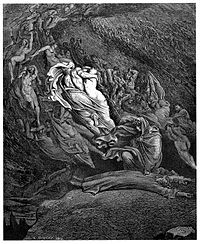Saturday, June 13, 2009
Tutto Dante: an evening in the Second Circle of Hell
(or, from the ridiculous to the sublime.)
The Italian actor, writer, director, etc. is also a Dante scholar, and he has been touring in a program called Tutto Dante, which ranges from humor to intellectual discourse to dramatic reading.
Benigni bounds onto the stage, in a manner that will be familiar to anyone who anyone who saw his reaction at the 1998 Oscar ceremony when Life is Beautiful won Best Foreign Film. His show begins with humor, with particularly pointed jabs at Silvio Berlusconi that were greeted with loud laughter and cheers by the largely Italian audience. He also took a swipe at ex-Governor Blagojevich. I don't know if it was a coincidence that there were two empty seats front row center, but he said, "Blagojevich booked a seat, and then sold it." He also expressed great admiration for Chicago, especially its architecture. He does not, however, understand why the cabs and hotels have the air conditioning turned on in this un-spring like weather (neither do I!).
After a while, Benigni becomes what you would like your college lecturer on Dante to be. (I have to say, though, that my high school English teacher effortlessly taught me to love his work.) His passion for the Divine Comedy is palpable, and his discussion of it deep and broad, if not always accurate. He begins by placing the text in its time and place, talking about Florentine history and politics, literature and philosophy.
quel giorno più non vi leggemmo avante
His focus is Canto V, the second circle of Hell, in which Dante meets and speaks with Francesca da Rimini, who tells him the story of her passion for her brother-in-law, Paolo Malatesta (the scene is depicted below in the Doré illustration):
Each tercet, in the Robert and Jean Hollander translation, is displayed, one at a time, on a screen as he delves into its meaning, its metaphors, what it shows us about the progress of literature. And here is where he, in his passion for this poem, goes, I think, a bit astray. He credits Dante with being the first to use "I" in poetry, to address and write about ordinary people. I immediately thought, "What about Sappho?" And she's not the only one. Nor was the concept of "pity" a new one; Aristotle spoke of it in his description of tragedy centuries earlier. Nevertheless, the discourse was instructive and compelling.
Then, Benigni set aside the lectern. The lighting changed. Facing the audience full-on, he took a breath, and, changing from English to Italian, he began:
Così descesi del cerchio primaio
giù nel secondo, che men luogo cinghia,
e tanto più dolor, che punge a guaio.
"From the first circle thus I came descending
To the second, which, in narrower compass turning,
Holds greater woe, with outcry loud and rending."
(Canto V, ll.1-3, Dorothy L. Sayers' translation)
He recited the entirety of the canto from memory. (I understand that he has the whole Commedia by heart!) The recitation was deeply moving, even to those of us whose knowledge of Italian (particularly medieval Italian) is not great. By the time he reached the end, e caddi come corpo morto cade ("and, as a dead man falling, down I fell"), we were on the edge of our seats.
Share the experience:
(Photo of publicity poster by: jkannenberg, Creative Commons by-nc-nd 2.0)
Subscribe to:
Post Comments (Atom)


Ahh...I love Dante...and Roberto Benigni too!
ReplyDeleteMust look into this.